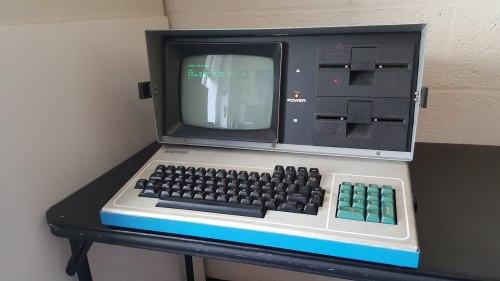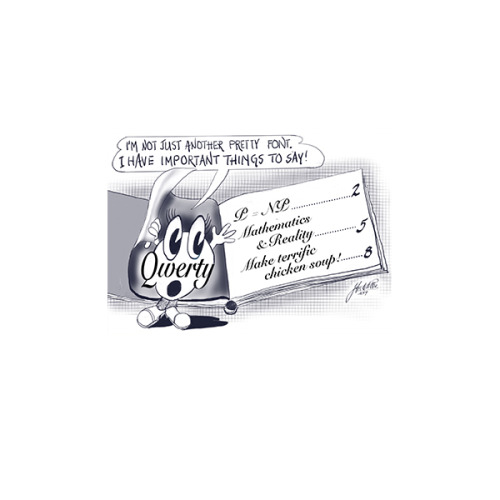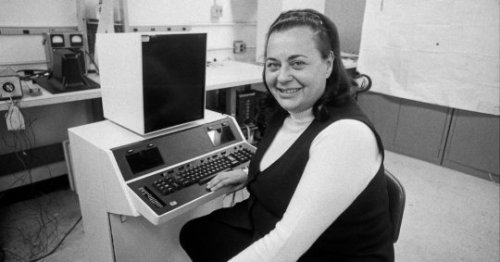
Eveyln Berezin, who I interviewed and whose story I tell in Track Changes, has passed. She was a remarkable woman with a remarkable career. Above is her New York Times obituary.
As I note in the introduction to Track, firsts are always tricky. A headline that claims the “first true word processor” is especially so. Here, in shorthand style, are a few contextual points:
- When it debuted in 1971, the Redactron Data Secretary was modeled on the IBM MT/ST, which had launched some seven years earlier, in 1964. IBM was also by then using the term “word processor” in its marketing. The Data Secretary improved on the IBM product in a number of ways—it was smaller, quieter, arguably more reliable—but the fundamentals were the same. Neither had a screen. Both used a Selectric typewriter as input and output device. Both stored character data on magnetic tape. The most significant difference was that the Data Secretary was one of the first products in the commercial market to make use of the new technology of integrated circuits, thus making it something closer to a programmable general purpose computer.
- Other competitor products were also quickly coming into the marketplace at about the same time, notably the Lexitron, which did have a screen.
- The line between “word processors” (which was more of a marketing term than anything else) and text editors has always been fuzzy. Text editors (and their kin, line editors) were used by programmers on early mainframe systems to write and correct code while it was still loaded into the system’s main memory. One did this by typing and revising text, first on a teletype and then on a screen with a keyboard. Such systems were in use by the late 1960s, and were arguably word processors in most respects. In 1972-3, the writer John Hersey would use a text editor to revise his novel My Petition for More Space and lay out camera ready copy for its publisher.
None of this is to detract from Evelyn Berezin’s accomplishment. She was a gifted programmer, engineer, and entrepreneur, and the Data Secretary was a successful product. But hopefully it adds a little more nuance to the labels of “first” and “true.”
In Memorium: Anthony Bourdain
Bourdain won acclaim for his Kitchen Confidential (2000) and other titles, and this photo (by Jack Manning for the New York Times; dated 1997) reminds us that in addition to a cook and a world traveler, he was, indeed, also a writer.
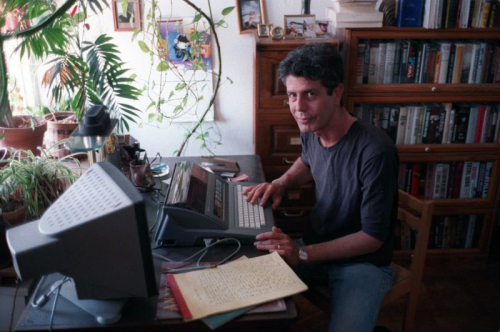
The word processor here is a Brother WhisperWriter WP-7550J. Thanks to Kevin Caliendo and Arlan Smallwood for assistance with identification.
Reviews in Umanistica Digitale and Revista Hispánica Moderna
Deeply appreciate these two new reviews in the Italian journal Umanistica Digitale (by Elena Spadini) and Revista Hispánica Moderna (PDF; by Grant Wythoff).
Wythoff concludes:
Kirschenbaum manages to make word processing feel strange on the same terms as the writers who first encountered it.
In Memorium: Ursula K. Le Guin’s “Processing Words”
I want to dream out words of anger / on this machine that states my mind
Ursula K. Le Guin wrote this poem on a word processor, or so we must presume. We don’t know exactly when, but it’s published (for the first time) in a 1994 collection called Going Out with Peacocks.
Of course it’s not really about word processing. Or is it? The republic of letters gives way to the war machine (which gave rise to the computer), and words themselves become processed as they are repeated and milled by the twelve short lines of the poem.
The ending, in particular, is scarily prescient these days:
The kind republic that we dreamed /
of building falls to night.
I don’t know very much else about Le Guin’s computing history. In Track Changes, I included the detail that she was not writing with a word processor as late as 1985, when she finished Always Coming Home; but she comments in a 2008 interview with Carl Freedman that she was:
… aware even back then that the computer might encourage certain complex movements of narrative—recursions, implications to be followed, forking paths, etc.—that were very much in my head as I wrote the book.
Anyway, here is the complete text:
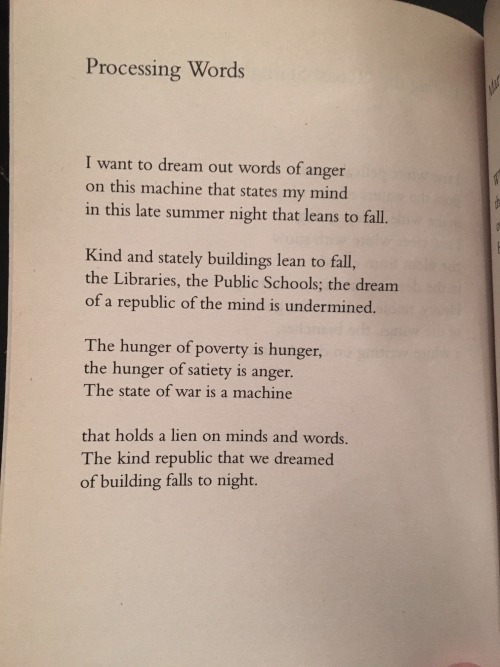
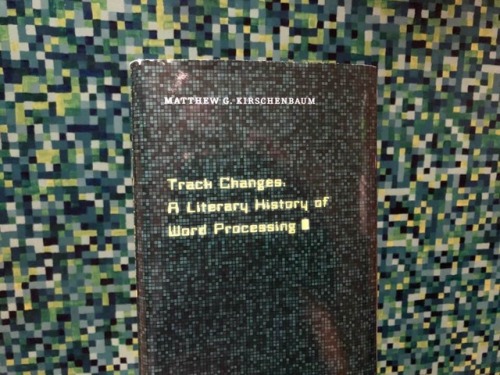
This is a truly superb bookie. My friend Scott Rettberg posted the following on his Facebook:
I had just finished reading Matthew Kirschenbaum’s Track Changes: a Literary History of Word Processing, an excellent and fascinating work of cultural/materialist/historical literary scholarship when my son observed that the cover is remarkably similar to Kathryn Gilligan’s Pi painting hanging on our wall.
Nicely done piece on word processing and born-digital materials in a major Italian daily citing Track Changes.
Two New Scholarly Reviews
Lai-Tze Fan has given the book a wonderful review for the Papers of the Bibliographical Society of Canada, commenting that “where Mechanisms changed the ways in which scholars and computer users think of what is behind the screen, Track Changes is decidedly broader in audience, interested in negotiating the roles of materiality and material modes of word processors as writing instruments.“
Meanwhile, over at long-running information studies journal Information and Culture, Peter Ward reviews Track Changes, calling the book “a catalogue of partnerships between authors and machines in the early word processing era” and suggesting that “researchers interested in the habits of literary creation, in literary biographies, and in the post-publication life of manuscripts will find innumerable benefits in these pages, along with avenues for future exploration.“
I’m grateful to both reviewers for their generous comments, and am especially gratified to see these two particular reviews juxtaposed, as between bibliography and information studies they neatly capture two of the most important academic constituencies for the book.
Reviewed in Financial Times
Track Changes was included alongside of two other books (and authors) I very much admire in this smartly written review essay published in Financial Times:
One of Kirschenbaum’s strengths is his ability to draw out the extent to which computerised writing technologies have embedded themselves into our very being, as we can only imagine other writing revolutions once did. When Stand by Me, the 1986 film based on Stephen King’s novella, was played in cinemas, some audiences apparently “howled in visceral anguish” at the end as the protagonist, now an author, switches off the computer on which he is typing the story without saving his work. It is strange to think that something so novel at the time had so quickly become so emotionally important. When Samuel Richardson’s 18th-century work of epistolary fiction Pamela was read aloud to illiterate villagers, the uplifting ending prompted church bells to ring out across the English countryside in celebration.
The reference to Stand by Me is my own, but the comparison to Pamela comes from the reviewer, Thomas Hale. And that’s just the kind of long-distance connection I’d hope the book would help to make.
Jerry Pournelle (1933-2017)
Dr. Jerry Pournelle, one of the key figures in my account of the early history of literary word processing, passed away yesterday. Though we had very different world views, he was accessible and … uninhibited in my correspondence and conversations with him.
Below is a shot of him at work with “Zeke,” his name for the Z-80 Cromemco microcomputer he purchased and began using probably in 1978 (note the dual monitors, impressive!).
Much more about Pournelle’s career is to be found in Track Changes, and I’m glad I was able to get a copy of the book to him about a year ago. Zeke, for its part, is currently in storage as part of the permanent collections at the Smithsonian Museum of American History.
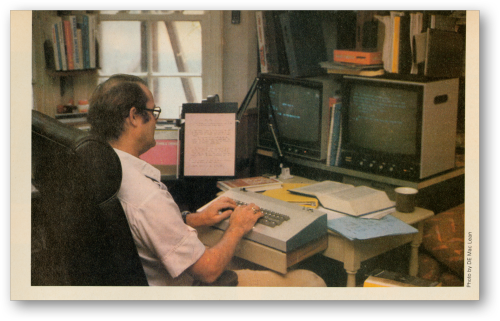
Reviewed in Cambridge Quarterly
One of the things you learn when you publish a book about word processing is that a review entitled “Cutting and Pasting” is not necessarily a sign that the work has been poorly received. The September issue of Cambridge Quarterly features a fine, extended discussion of Track Changes from Michael Kalisch with just that title.
The issue is pay-walled for subscription access, but here’s a taste:
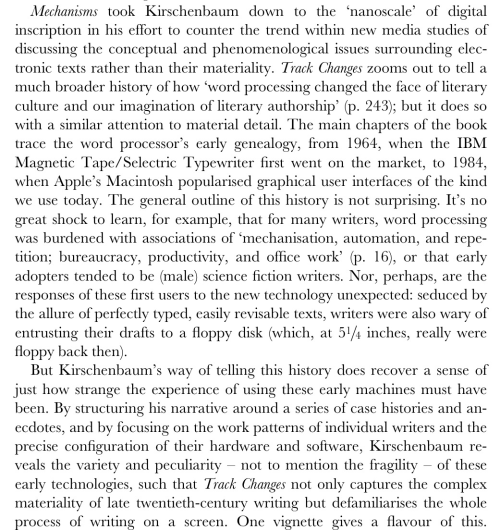
Terry Pratchet’s Hard Drive, Containing Unpublished Novels, Destroyed by Steam Engine as per his Will
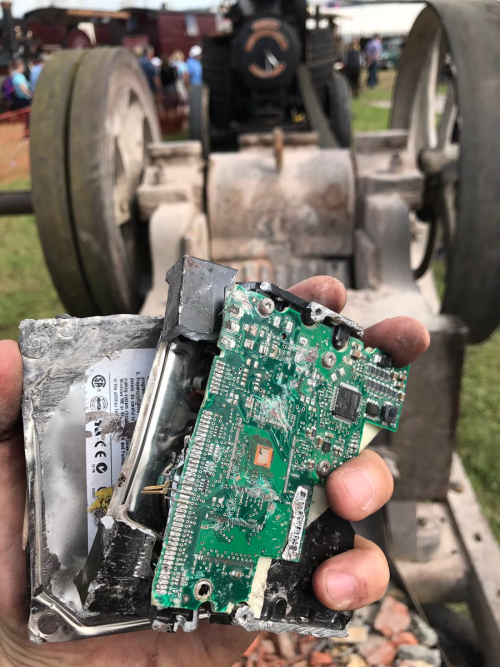
According to the BBC coverage here:
Richard Henry, curator of Salisbury Museum, said: “The steamroller totally annihilated the stone blocks underneath but the hard drive survived better than expected so we put it in a stone crusher afterwards which I think probably finally did it in”.
Chapter 10 of Track Changes is entitled “What Remains,” and takes up the question of a writer’s digital literary legacy.
The pieces of the hard drive will reportedly be placed on display at the Museum.
Reviews in American Archivist and Interactions
One of the explicit audiences I had in mind when writing Track Changes was the libraries and archives community, where professionals are doing the essential work of preserving our increasingly born-digital records and heritage. To that end, I’m delighted with two new reviews in venues largely dedicated to those constituencies.
Seth Erickson reviewed the book for Interactions, UCLA’s Journal of Education and Information Studies. “Dozens of authors’ experiences with early word processors coupled with Kirschenbaum’s (frankly) loving attention to the technical and “material particulars” of these scenes of writing, are the warp and weft of Track Changes,” he comments.
Meanwhile, Thomas Padilla reviews the book at American Archivist, the premier journal in its field in the United States. Padilla pays particular attention to the book’s potential impact in libraries and archives, concluding:
Track Changes is undoubtedly a foundational work that bears immediate value and will likely continue to do so for the foreseeable future. While the work will have immediate resonance with archivists and librarians directly engaged in the work of preserving and providing access to digital literary materials, the text is crafted in such a way that it can readily serve as a meeting ground for productive discussion between colleagues working in disparate (inter)professional and (inter)disciplinary roles.
I am thrilled with both.
An excellent short review of Track Changes by Thomas Pletcher. Excerpt:
The book is nicely written, with an appealing tongue-in-cheek humor. If you’re at all interested in how writing gets put together, this is highly recommended.

